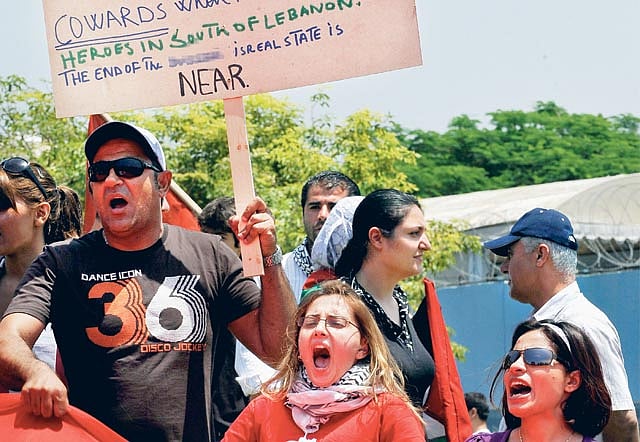Damascus: Monday's shocking Israeli attack of a humanitarian aid ship Mavi Marmara has pushed the Middle East region further to the edge, as it is already highly tense given Israel's repeated threats against Lebanon.
On Monday, a day before the attack, Israeli Deputy Foreign Minister Daniel Ayalon had threatened Lebanese Prime Minister Sa'ad Hariri, saying Lebanon would pay "a heavy price" in the event of any war between Israel and Lebanon.
The threats began in late 2009 when Israel accused a German ship Francop of carrying arms from Iran to Hezbollah, via Syria and accumulated in April with remarks by Israeli President Shimon Peres, accusing Syria of transferring Scud missiles to Hezbollah.
According to Haaretz military correspondent Amos Harel, the forces are preparing for a new war next summer with Iran, Hamas, Hezbollah, and Syria while Israeli military and air drills on the border with Lebanon have put the leaders of Hezbollah in a state of high alert.
Earlier in the year, Syrian Foreign Minister Walid Al Mua'allem had described the Israelis as "thugs" and threatened a regional war if Israel went to war next summer either with Damascus or Beirut, or both.
Speaking to US Senator Bob Corcker, who happened to be in Damascus on the day of the attack, Syrian President Bashar Al Assad said: "US support for Israel—regardless of what crimes it commits—has led shattering stability in the region."
He called on the US to "pressure Israel to cease its vicious attacks and lift the siege on Gaza".
All parties are waiting to see what Turkish Prime Minister Recep Tayyip Erdogan will do and say as he heads back to his country, having cut short a state visit to Chile.
Al Assad telephoned his Turkish counterpart Abdullah Gul, offering condolences for the 15 Turkish civilians killed onboard the Freedom Flotilla. The attack comes during a warm honeymoon between Syria and Turkey, which has witnessed unprecedented coordination in politics, economics, and development projects.
One thing is for sure, Turkish mediation for indirect Syrian-Israeli peace talks, which started in April 2008 and ended with the Gaza War in December of that year, has come to a grinding and final halt.
During Al Assad's latest visit to Turkey, his Turkish counterpart said that his country and Syria were still committed to indirect peace talks with Israel, but that the Netanyahu government was no longer interested, since it claims that Turkey is no longer an impartial player in the Middle East, having clearly taken sides with Syria, Hamas, and Hezbollah.
After Erdogan's thundering statements against Shimon Peres at Davos in January 2009, and the latest attack on the Turkish ship Marmara on May 31, Turkey as well, is clearly, very angry and no longer interested in any contacts with the Israelis.
The Turkish Ambassador to Israel Oguz Celikkol has been recalled to Ankara while Erdogan accused Israel of "state terror," bringing relations down to rock bottom between Ankara and Tel Aviv.
Most analysts are expecting an angry response from Erdogan, and a temporary freeze in diplomatic relations, but nobody is predicting war between Turkey and Israel. That cannot be said for sure, however, on the Lebanese-Israeli border, as tensions continue to rise with Hezbollah and might explode in the summer.
Sign up for the Daily Briefing
Get the latest news and updates straight to your inbox
Network Links
GN StoreDownload our app
© Al Nisr Publishing LLC 2025. All rights reserved.
